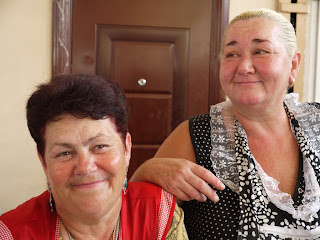 |
| Everything is Illuminated, sourced http://hotpotofcoffee.tumblr.com |
By now, via screen or page, it seems everyone has taken in
the vast, almost magical fields of sunflowers in Jonathon Safran Foer’s Everything is Illuminated. Love or
loathe Everything is Illuminated (not
to cop out but I find myself squarely on the middle ground, except where Eugene Lutz is concerned.), it set an
imagination of the Ukrainian countryside as a sunny, golden sea.
I must admit, there is something sort of dreamy or wistful
about sunflowers, their vibrant yellow color, the way they are said to lift their
heavy heads together, following the sun across the sky. (This tracking of the
sun is called heliotropism but there
appears to be lack of consensus as to whether sunflowers are true heliotrophs
or maybe only in early life stages. As a child of the American Midwest, I swear that I have witnessed this. Any sunflower scientists out there that
can clarify?)
 | ||
| From train window, central Ukraine, photo courtesy of pickle pal Linda Knudsen McAusland |
In the genus Helianthus (sound familiar?) with
sunchokes, sunflowers originate in the Americas but were brought to Europe by
those intrepid Spaniards in the 16th Century. According to Cullinaria, edited by Marion
Trutter (2006), sunflowers came to the Dnieper Valley with Peter the Great, after
a trip to Western Europe in the mid 1500s. Peter, who was something of a sunflower
aficionado, was fond of their bright colors but they soon emerged as an
important food source.
Sunflowers, соняшник in Ukrainian, are grown for seeds, which are pressed
for oil or cracked and roasted as a food stuff for people and animals, particularly poultry. Referencing my trusty Encyclopedia of Organic Gardening (Rodale,
1971), I learned that sunflowers are highly nutritious, very rich in protein,
calcium, phosphorus, thiamin, riboflavin and niacin and are an important source
of linoleic acid (good for hair and skin, by the way). Sunflower oil is
generally cold pressed, which helps to retain the oils nutrients and vitamins. In my experience, sunflower oil is the oil of
choice among Ukrainian cooks. It complements fresh veggies, as well as meats.
 |
| From train window, central Ukraine, photo courtesy of pickle pal Linda Knudsen McAusland |
Oil production began in Ukraine around 1835 and that the Kherson
and Zaporhiza regions were critical to fat supplies during the Second World War
and in the Soviet Area. Overtime, sunflower oil production has remained an important
economic resource in Ukraine, though the industry has struggled to keep pace
with crop resistance and industry standards. All that said, according to this
recent post from PR Newswire, Ukraine now produces a quarter of world’s
sunflower oil, comprising 51% of the global export market for the commodity.
Interestingly, India is the top consumer of Ukraine’s sunflower oil. A 15%
decline in production is anticipated for Ukraine’s sunflower oil production
over the next year, based on adverse weather projections.
 |
| Sunflower seeds at Odessa's Central Market, photo by Linda |
Whole sunflower seeds are a very popular Ukrainian snack and are found
studding breads and sweets. Markets stalls feature a dizzying array of
varieties and preparations. On street corners, kerchiefed grannies sell sunflower
seeds for birds.































